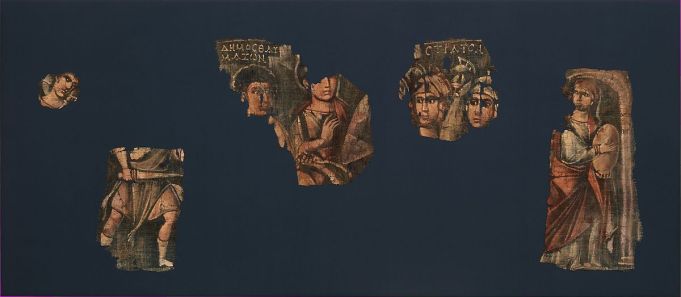Posts Tagged ‘English Civil Wars’
“There is a time for everything”*…

… and the time for the Word came later than many of us seem to understand…
The oldest scriptures that eventually became the Bible were created within an environment where no appreciable religious function was assigned to texts. The stories, proverbs, songs, and prayers dating from the ninth and eighth centuries bc that researchers have managed to reconstruct from the Bible are examples of literature rather than holy scripture. They evolved into scripture through a lengthy process.
What scholars call a “cult religion” was practiced in Israel and Judah in the period before the Babylonian Exile (586–538 bc). Religious observance centered on local shrines, and contact with the deity was maintained through sacrifices, votive offerings, and prayer. In the late pre-exile period, that is, the final decades of the seventh century bc, cultic activities in Judah came to be focused on a single temple in Jerusalem. The Bible portrays this process as part of the religious reforms undertaken by Josiah (2 Kings 22–23).
Of course, religious texts also had their place within this cult, but they did not play a key role in either its foundation or its normalization. Instead, like the religious paraphernalia in the temple, they simply formed one aspect of cultic activities…
Judaism only became a “religion of the book”—that is, one whose core entailed the study of sacred texts—following the destruction of the Second Temple by the Romans in 70. With the demise of the sacrificial cult of the temple, the faith shifted entirely to the study and celebration of the scriptures.
And it was not until that stage that the concept of the Bible as a complete, authoritative collection of texts arose. Its texts had almost certainly been in religious use before this, but alongside many other documents. A strict dividing line between biblical and nonbiblical literature did not exist at that time, since there was as yet no such thing as the Bible. And so the belief system of Israel and Judah changed gradually over the course of the first millennium bc from a cult religion to a religion of the book…
Scripture before the Bible: “Becoming a Religion of the Book,” an excerpt from The Making of the Bible: From the First Fragments to Sacred Scripture by Konrad Schmid and Jens Schröter in Lapham’s Quarterly (@laphamsquart)
* The Bible, Ecclesiastes 3:1
###
As we tackle the text, we might recall that it was on his date in 1538 that Pope Paul III excommunicated King Henry VIII of England. The reasons were many: First, Henry had illegally married his new wife Anne Boleyn and left his former Queen Katherine of Aragon. Then he had proclaimed himself head of the Church of England, denying the papal primacy. He disbanded English monasteries and appropriated much of their assets.
The original bull of excommunication had been issued on 30th August 1535, but the excommunication had been suspended in the hope that Henry would mend his ways. When Henry sacked St. Thomas Becket’s shrine, the Pope decided to act.
The break with Rome was, at first, largely political (and personal). But as the years passed, the theology and liturgy of the Church of England became markedly Protestant, especially during the reign of Henry’s son Edward VI, largely along lines laid down by Archbishop Thomas Cranmer. Under Mary, the process was reversed and the Church of England was again placed under papal jurisdiction. But Elizabeth reintroduced the Protestant religion (albeit in a more moderate manner).
The structure and theology of the church was a matter of fierce dispute for generations. The most violent of these disputes, the English Civil Wars, ended when the last Roman Catholic monarch, James II, was deposed and Parliament employed William III and Mary II jointly to rule in conjunction with the English Bill of Rights in 1688 (in the “Glorious Revolution“), from which emerged a church polity with an established church (The Church of England) and a number of non-conformist churches whose members suffered various “civil disabilities”– until these were removed many years later. A substantial but dwindling minority of people from the late 16th to early 19th centuries remained Roman Catholic in England. Their church organization remained illegal until the Relief Act of 1829.

You must be logged in to post a comment.